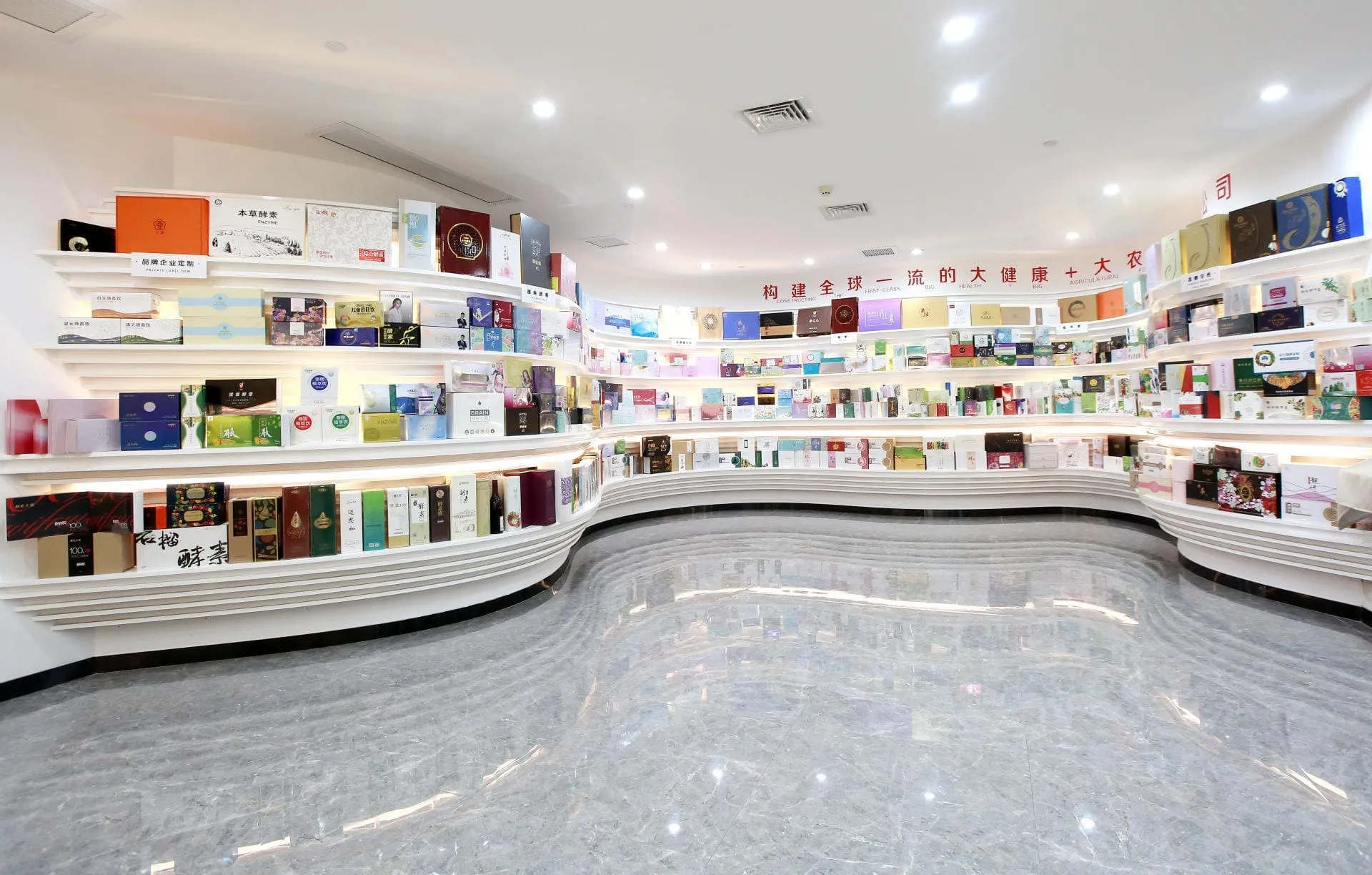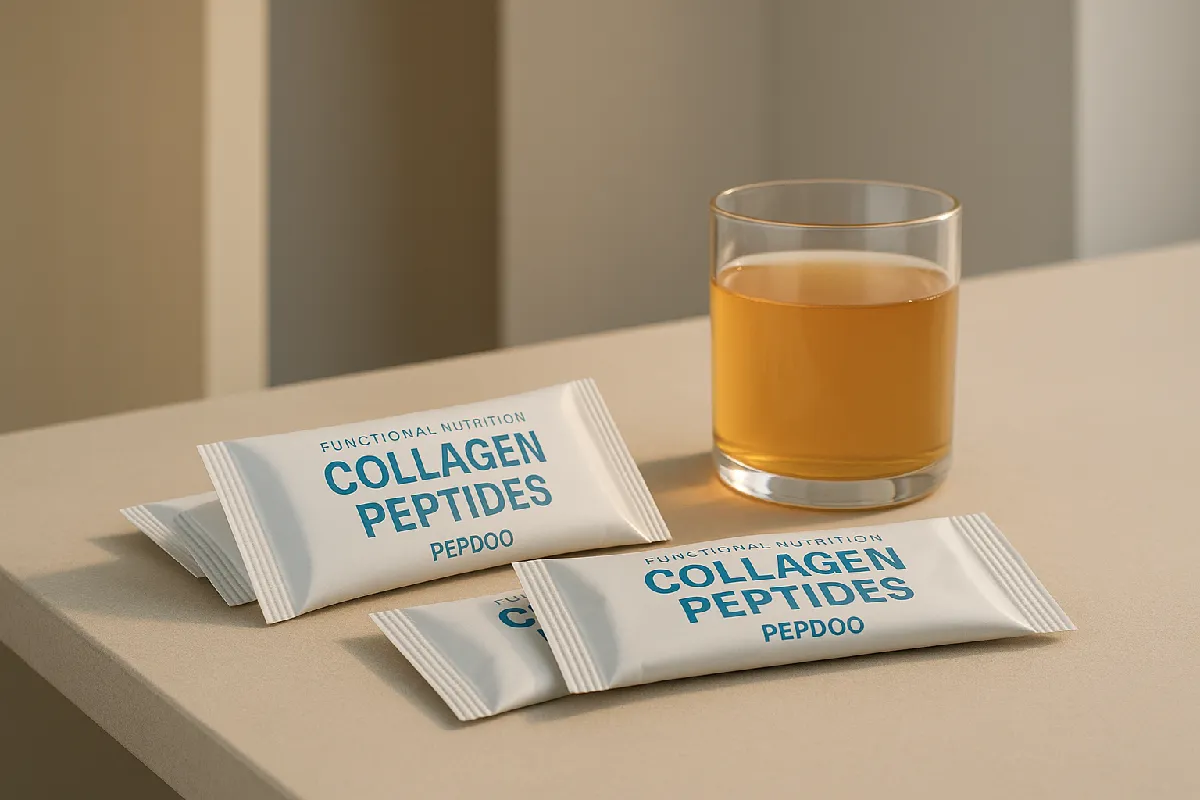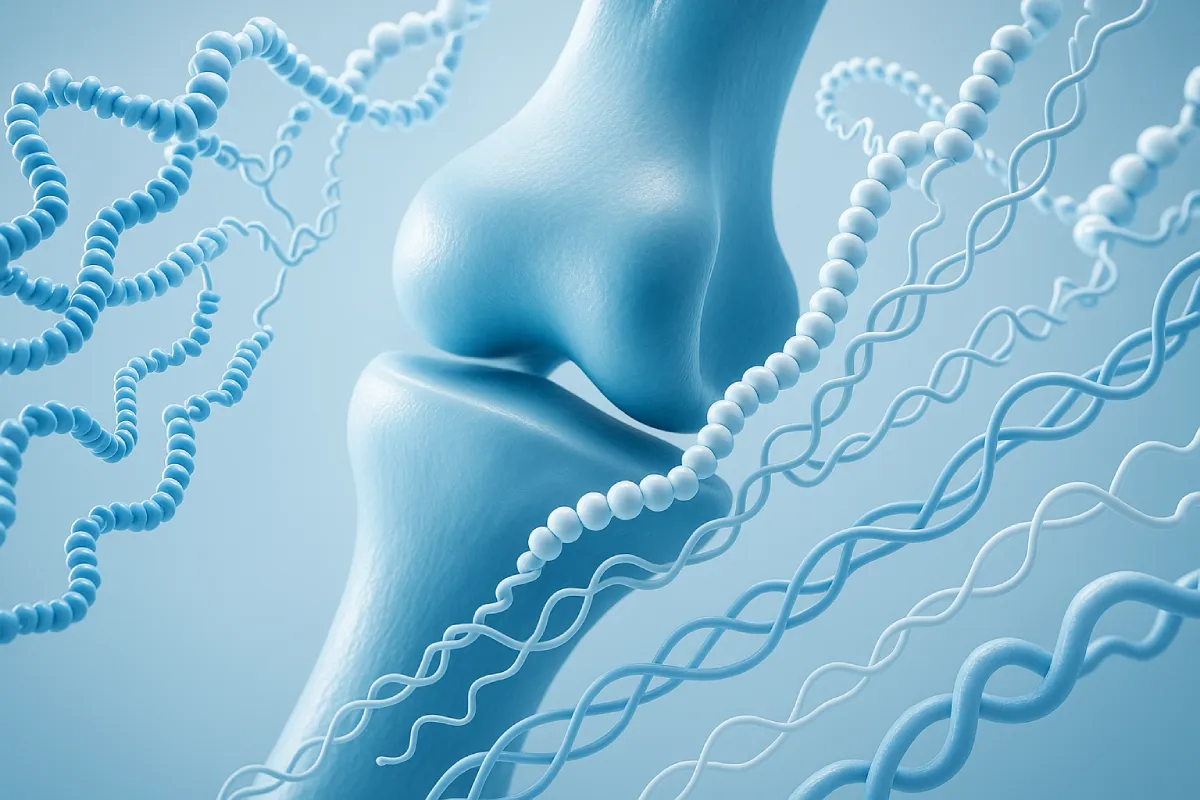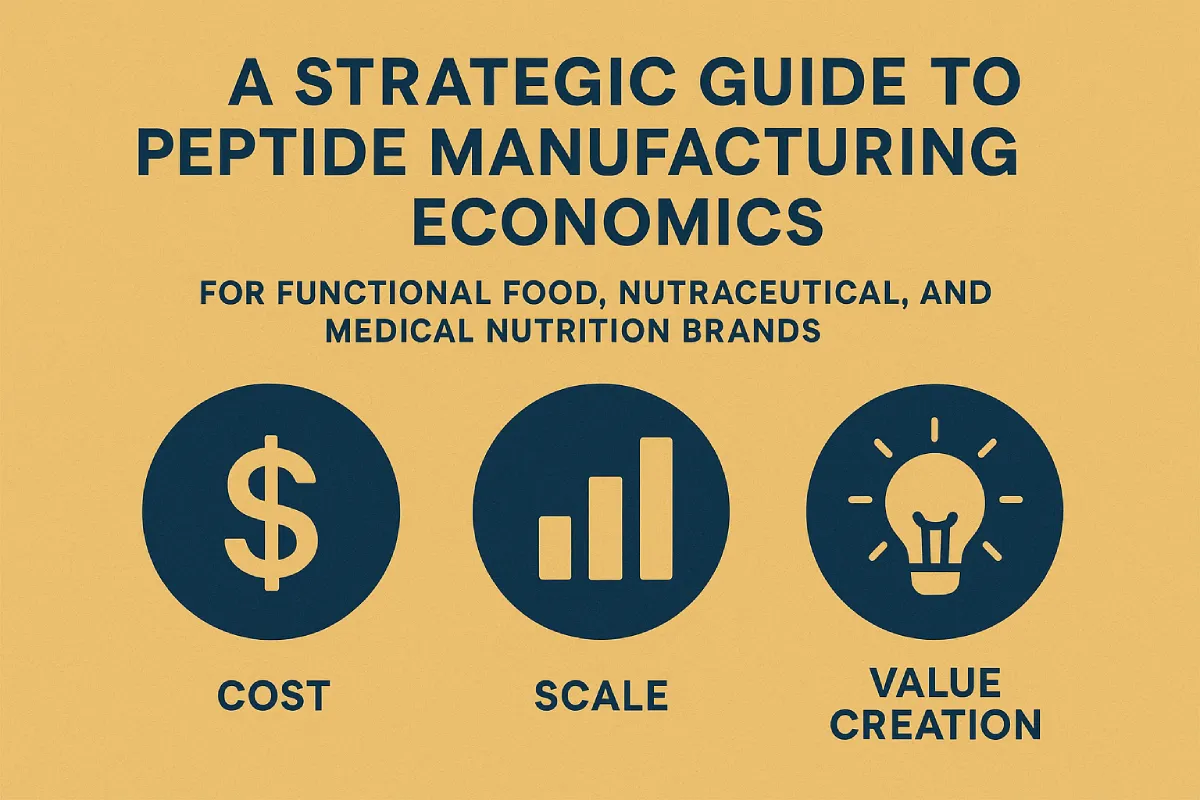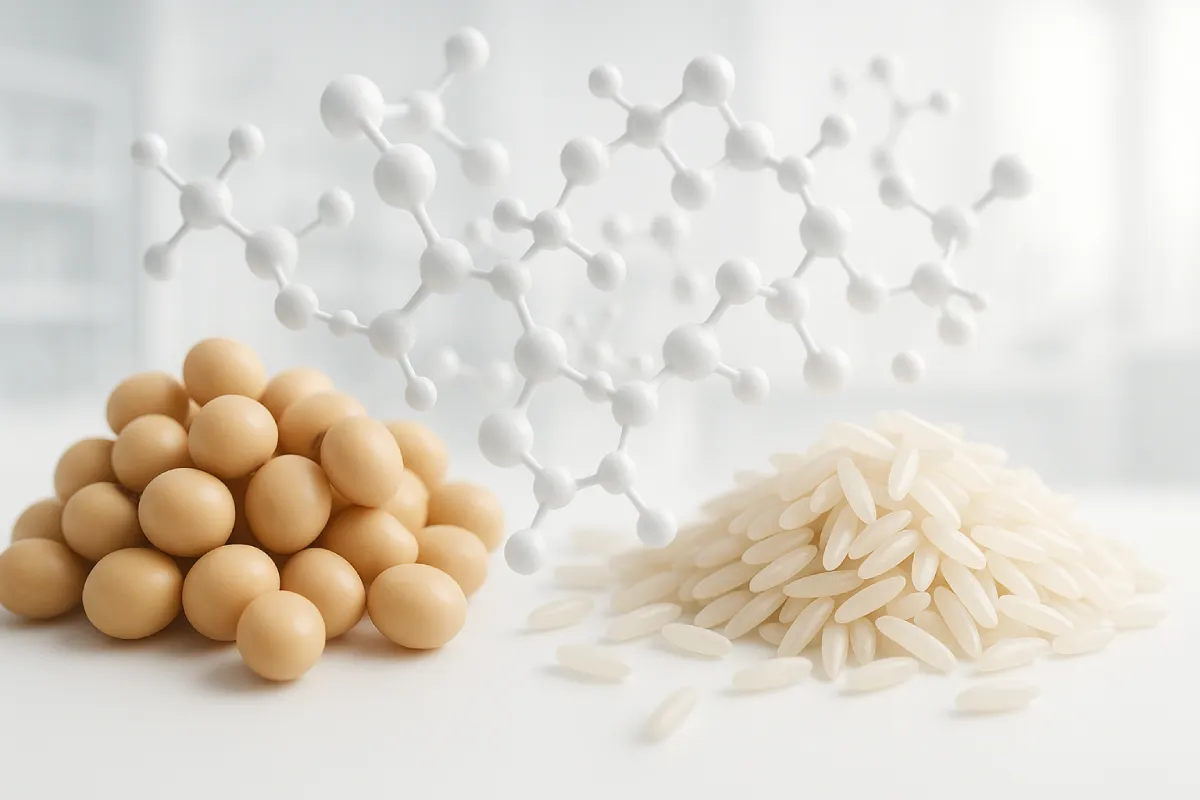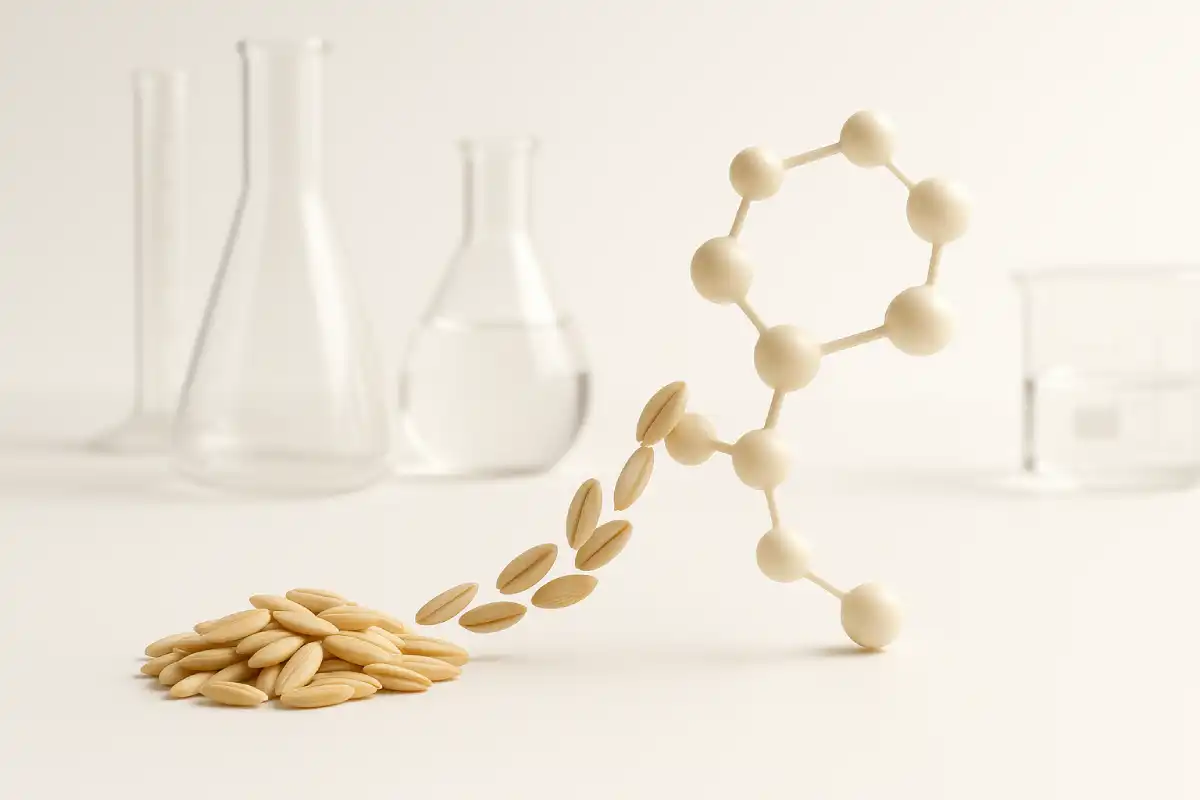Market Context & Industry Relevance of Marine Collagen Peptides
The global functional nutrition market is evolving rapidly, with consumers demanding scientifically backed, clean-label ingredients that deliver real benefits. Among these, marine collagen peptides have emerged as one of the fastest-growing raw materials in functional foods, nutraceuticals, and medical nutrition products.
For B2B buyers, from R&D specialists to procurement managers, marine collagen peptide represents not only a bioactive ingredient but also a differentiation opportunity. Its high bioavailability, versatility in formulation, and sustainable sourcing make it highly relevant for product innovation.
As a full-category peptide manufacturer, PEPDOO® stands out in this field. The company is not only a formulator of industry standards in China, but also ranks among the top patent holders of small-molecule peptides, leveraging internationally advanced hydrolysis technologies to provide scalable, high-quality marine collagen peptide solutions for global brands.
What Are Marine Collagen Peptides?
Marine collagen peptides are bioactive peptides derived mainly from fish skin, scales, or bones through controlled enzymatic hydrolysis. Compared to bovine or porcine collagen, marine collagen peptides are characterized by:
- Lower molecular weight → resulting in higher bioavailability and faster absorption [1].
- Superior solubility → making them easy to formulate in beverages, powders, and capsules.
- Neutral taste profile → enabling broad applications in nutraceuticals and functional foods.
These attributes make marine collagen peptide particularly attractive for B2B companies developing consumer products targeting skin health, joint mobility, or active lifestyle segments.
PEPDOO® utilizes a multi-enzyme hydrolysis process, a patented technology that ensures peptide chains remain in a low molecular weight range (<1,000 Da). This guarantees maximum absorption efficiency while maintaining batch-to-batch consistency.
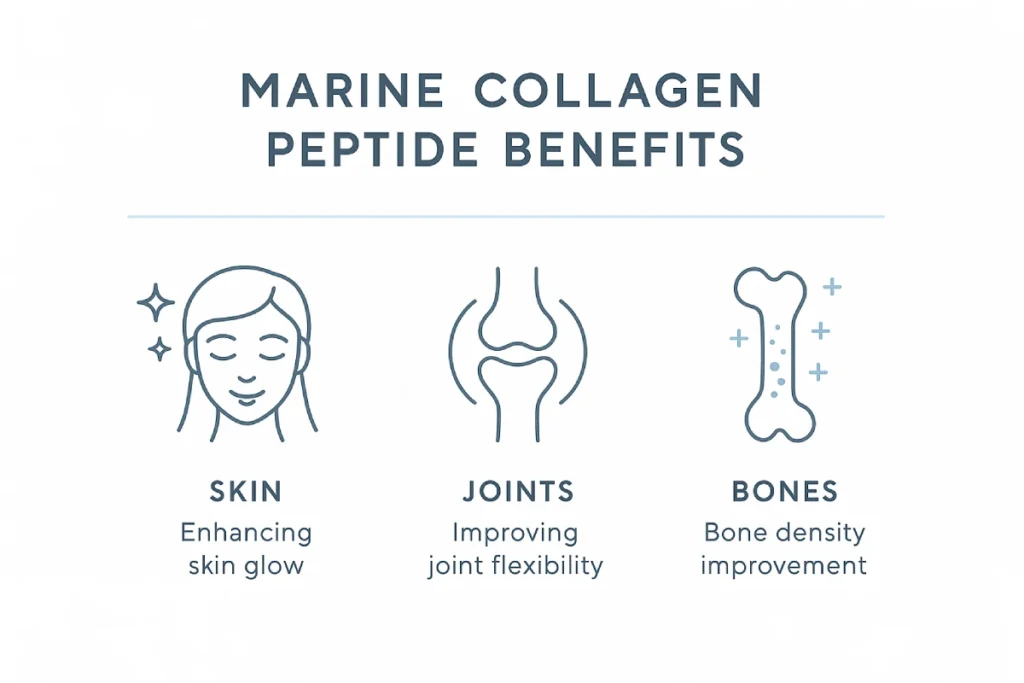
Health & Functional Benefits of Marine Collagen Peptides
Skin Health & Anti-aging
Marine collagen peptides stimulate dermal fibroblasts, enhancing collagen synthesis and improving elasticity and hydration [2]. This makes them a cornerstone ingredient for nutricosmetic brands targeting beauty-from-within markets.
Joint & Bone Support
Collagen peptides contribute to cartilage integrity and bone mineral density. Clinical trials suggest marine collagen supplementation can improve mobility and reduce joint discomfort in aging populations [3].
Sports & Muscle Recovery
For the sports nutrition segment, marine collagen peptide supports tendon and ligament recovery, offering a natural alternative to conventional protein supplements [4].
Metabolic & Immune Support
Emerging evidence links collagen peptides with improved gut barrier function and reduced inflammation, opening opportunities for immune-support functional foods [5].
Case Example
- A Japanese beauty brand integrated PEPDOO® marine collagen peptide into its oral powder. Within three months, sales exceeded USD 5 million, fueled by consumer demand for anti-aging products.
- A European sports nutrition company partnered with PEPDOO® to co-develop a peptide-protein blend for joint and muscle recovery, gaining rapid market adoption.
Applications in Functional Nutrition & Product Development
Marine collagen peptides can be seamlessly incorporated into:
- Functional beverages (ready-to-drink shots, protein waters)
- Powder formulations (sachets, stick packs)
- Capsules & tablets (nutraceutical supplements)
- Medical nutrition products (special dietary formulations for elderly care or clinical settings)
- Nutricosmetics (beauty supplements for skin, hair, and nails)
PEPDOO® offers custom peptide blends, combining marine collagen peptides with soy peptide, oyster peptide, or collagen tripeptide to help brands achieve differentiated product positioning. This versatility is particularly valued by R&D teams seeking innovative, multi-functional formulations.
Sourcing & Supply Chain Considerations
Raw Material Sources
- Fish skin: High collagen content, widely used.
- Fish scales: Lower fat content, offering a purer profile.
- Fish bones: Rich in minerals, suitable for bone-health formulations.
Extraction & Hydrolysis Technology
Advanced enzymatic hydrolysis ensures small molecular weight peptides, stable performance, and better taste profile. PEPDOO® applies proprietary hydrolysis processes with international GMP standards to ensure quality.
Quality & Compliance Standards
B2B buyers need assurance of regulatory compliance. Marine collagen peptide supplied by PEPDOO® meets ISO, HACCP, GMP, Halal, and Kosher certifications, aligning with requirements in the EU, US, and China markets.
Sustainability
As global consumers increasingly prioritize sustainability, marine collagen peptide derived from by-products of the fishing industry aligns with circular economy principles and ESG standards.
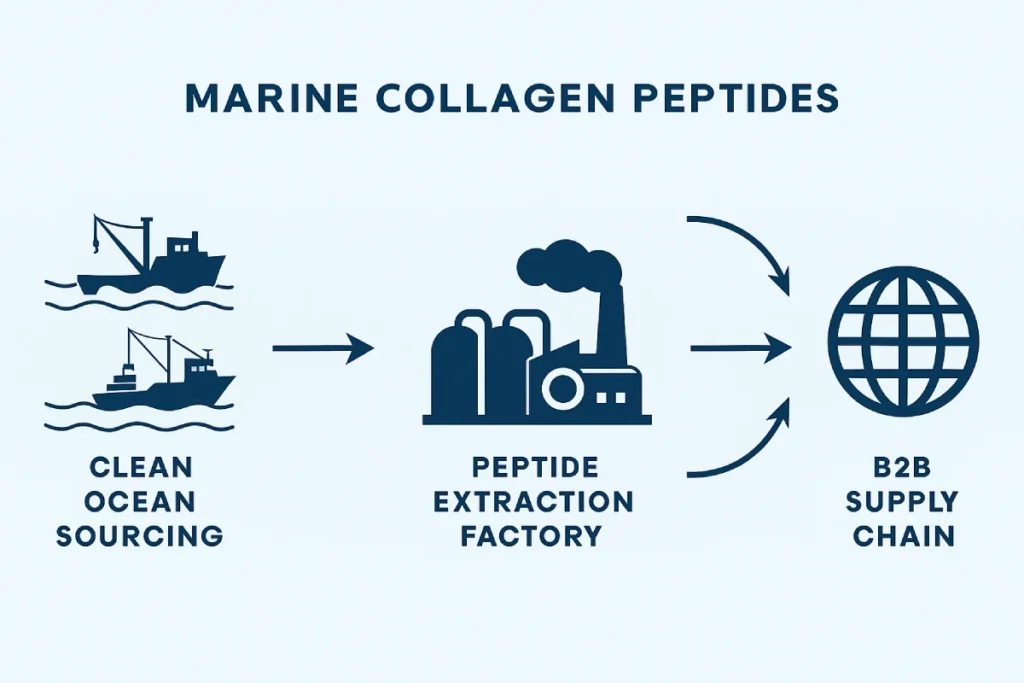
Choosing the Right Marine Collagen Peptide Manufacturer
Selecting a supplier goes beyond price—B2B customers must evaluate:
- Patented hydrolysis technologies ensuring product performance
- Batch consistency & traceability for large-scale procurement
- Customization capability to align with market trends
- Regulatory and international certifications
Why PEPDOO®?
- Full-category peptide manufacturer: covering marine collagen peptide, soy peptide, oyster peptide, peanut peptide, collagen tripeptide, and more.
- Industry standards formulator: contributor to peptide quality benchmarks in China.
- Patent leadership: one of the top holders of small-molecule peptide patents in China.
- Internationally advanced hydrolysis technology: delivering consistent, high-purity functional peptides at scale.
Success Case
- A leading Chinese medical nutrition company incorporated PEPDOO® marine collagen peptide into its elderly nutrition powder. The product passed national special food approval and captured significant hospital market share.
- A North American nutraceutical brand collaborated with PEPDOO® on a collagen capsule line. Within one year, it became a top-selling product on Amazon, accumulating over 20,000 positive reviews.
Future Trends in Marine Collagen Peptides
- Customized peptide formulations (marine peptide + plant-based peptides)
- Silver economy nutrition: addressing bone, joint, and skin health for elderly consumers
- Sports recovery & performance: combining collagen peptides with electrolytes and amino acids
- Market growth: projections suggest the global marine collagen market may exceed USD 1.5 billion by 2030 [6].
Strategic Takeaways for B2B Buyers & Brand Owners
Marine collagen peptides are more than just another protein—they represent a strategic raw material for innovation in functional nutrition.
For procurement and R&D leaders, choosing the right supplier is critical. By partnering with a patent-driven, standard-setting, full-category peptide manufacturer like PEPDOO®, brands can secure reliable sourcing, ensure product differentiation, and align with global health trends.
PEPDOO® has already helped leading brands in Asia, Europe, and North America succeed with collagen innovations. With a commitment to internationally advanced technology, quality assurance, and sustainability, the company is ready to support your next functional food or nutraceutical breakthrough.
Partner with a Leading Marine Collagen Peptide Manufacturer
As a full-category peptide manufacturer and one of China’s industry standard setters, PEPDOO® provides high-purity marine collagen peptides backed by patented hydrolysis technologies. Trusted by global nutraceutical and functional food brands, we deliver stable supply, consistent quality, and innovative peptide solutions.
Get a Custom Quote📩 Contact us today to explore bulk supply and OEM solutions.
FAQ
Marine collagen peptide offers lower molecular weight, higher bioavailability, and superior solubility. This translates to faster absorption, better efficacy in anti-aging, joint support, and sports nutrition products. B2B buyers should consider these functional advantages when selecting peptide sources for product differentiation.
Yes. Leading manufacturers like PEPDOO® provide Halal, Kosher, and GMP-certified marine collagen peptides. For global B2B procurement, verifying regulatory compliance early helps avoid product launch delays and ensures eligibility for multiple markets.
Common dosage forms include powder sachets, ready-to-drink beverages, capsules, and tablets. Choosing the right form depends on your target consumer segment, absorption requirements, and compatibility with other functional ingredients.
Manufacturers with patented hydrolysis technology and full-scale production capacity, like PEPDOO®, offer strict QC, batch traceability, and scalable supply. B2B buyers should prioritize partners who can guarantee consistent peptide quality across large-volume orders.
Request certificates of analysis (CoA) for molecular weight distribution, amino acid profile, and bioactivity tests. Collaborating with suppliers who provide independent lab verification ensures your product claims are credible.
Yes. Full-category peptide manufacturers can create blends with other peptides (e.g., soy peptide, oyster peptide, collagen tripeptide) to achieve targeted functional benefits, such as joint support + skin elasticity or muscle recovery + immunity enhancement.
Evaluate solubility, taste, heat stability, and pH compatibility. Working with experienced peptide manufacturers ensures formulations are stable, bioactive, and compliant with regulatory standards, reducing trial-and-error in product development.
Using high-bioavailability, sustainably sourced marine collagen peptides allows brands to claim scientific backing, premium ingredients, and functional benefits. This can improve market perception and support higher price positioning in competitive segments.
References
- Gómez-Guillén, M. C., Giménez, B., López-Caballero, M. E., & Montero, M. P. (2011). Functional and bioactive properties of collagen and gelatin from alternative sources: A review. Food Hydrocolloids, 25(8), 1813–1827.
- Proksch, E., Segger, D., Degwert, J., Schunck, M., Zague, V., & Oesser, S. (2014). Oral supplementation of specific collagen peptides has beneficial effects on human skin physiology: A double-blind, placebo-controlled study. Skin Pharmacology and Physiology, 27(1), 47–55.
- Bello, A. E., & Oesser, S. (2006). Collagen hydrolysate for the treatment of osteoarthritis and other joint disorders: A review. Seminars in Arthritis and Rheumatism, 36(3), 171–176.
- Clark, K. L., Sebastianelli, W., Flechsenhar, K. R., Aukermann, D. F., Meza, F., Millard, R. L., … & Deitch, J. R. (2008). 24-Week study on the use of collagen hydrolysate as a dietary supplement in athletes with activity-related joint pain. Current Medical Research and Opinion, 24(5), 1485–1496.
- Kitakaze, T., Yoshizaki, N., Kobayashi, Y., & Tsuruta, T. (2016). Collagen peptides mitigate intestinal barrier dysfunction in experimental colitis. Journal of Functional Foods, 23, 464–472.
- Grand View Research. (2022). Marine Collagen Market Size, Share & Trends Analysis Report.

